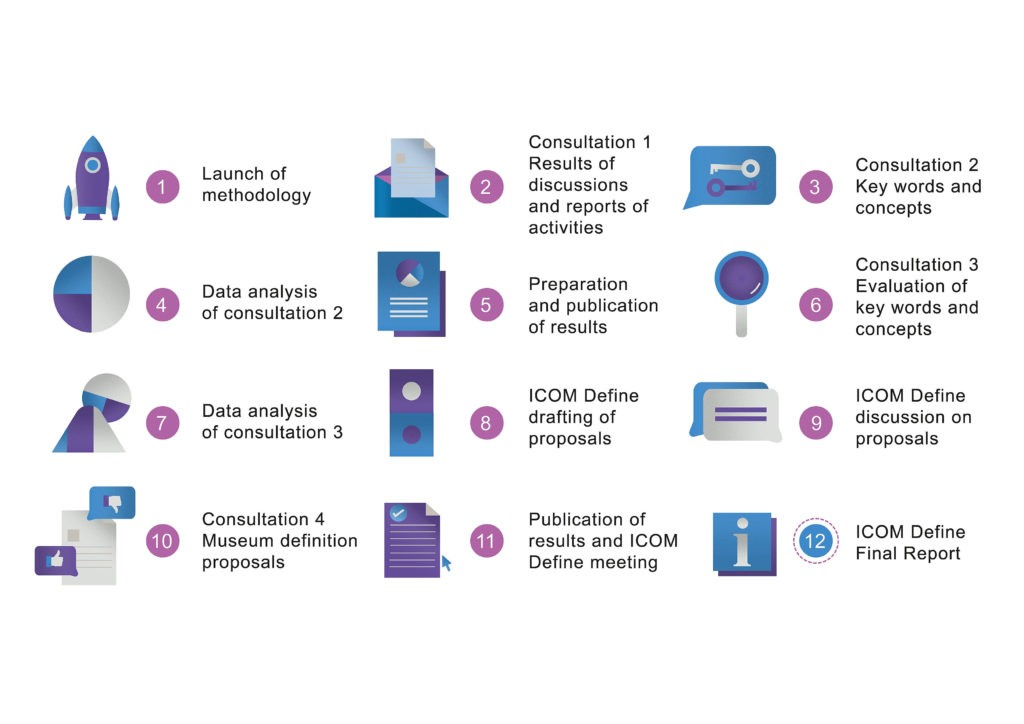The International Council of Museums (ICOM) plays a crucial role in defining and shaping the future of museums worldwide. A key aspect of this role is the ongoing evolution of the very definition of what constitutes a museum. This article delves into the recent activities of ICOM, specifically focusing on the “ICOM Define” initiative and its comprehensive process of redefining the museum for the 21st century. This involved extensive consultations and culminated in a new definition adopted in Prague in 2022.
 altICOM Define: A Collaborative Approach to Redefinition
altICOM Define: A Collaborative Approach to Redefinition
Recognizing the need for a more democratic and transparent process, ICOM established the Standing Committee for the Museum Definition, later renamed “ICOM Define.” This committee spearheaded the initiative to redefine the museum, employing a methodology centered on open consultation and collaboration with National Committees, International Committees, Regional Alliances, and Affiliated Organizations.
Four Phases of Consultation: Gathering Global Perspectives
The redefinition process unfolded through four distinct consultation phases, each designed to gather diverse perspectives from the global museum community.
Consultation 1: Focused on gathering reports from committees on activities related to the museum definition conducted in 2019/2020. This initial phase provided valuable insights and laid the groundwork for subsequent consultations.
Consultation 2: This phase delved into the core keywords and concepts that should be included in the new museum definition. Independent data analysts were employed to analyze the quantitative and qualitative data collected from ICOM members worldwide.
Consultation 3: Building upon the results of Consultation 2, this phase invited feedback on the identified keywords and concepts through an online form. The responses were analyzed and compiled into a comprehensive report.
Consultation 4: This crucial phase involved the drafting of five potential museum definition proposals based on the previous consultations. ICOM committees ranked these proposals and provided commentary, ultimately leading to the selection of two final proposals. The Advisory Council then voted on these two, selecting one for presentation to the Extraordinary General Assembly.
The New Museum Definition: A Reflection of Modern Values
The culmination of this extensive process was the adoption of a new museum definition at the Extraordinary General Assembly in Prague on August 24, 2022. The new definition states:
“A museum is a not-for-profit, permanent institution in the service of society that researches, collects, conserves, interprets and exhibits tangible and intangible heritage. Open to the public, accessible and inclusive, museums foster diversity and sustainability. They operate and communicate ethically, professionally and with the participation of communities, offering varied experiences for education, enjoyment, reflection and knowledge sharing.”
This updated definition reflects a contemporary understanding of the museum’s role in society, emphasizing accessibility, inclusivity, sustainability, and community engagement.
ICOM’s Commitment to Ongoing Evolution
The Icom A initiative, through its meticulous and collaborative approach, has successfully redefined the museum for a new era. This process underscores ICOM’s commitment to continuous evolution and its dedication to ensuring that museums remain relevant and vital institutions in the 21st century. The new definition serves as a guiding principle for museums worldwide, encouraging them to embrace their role as agents of social change and cultural preservation.

